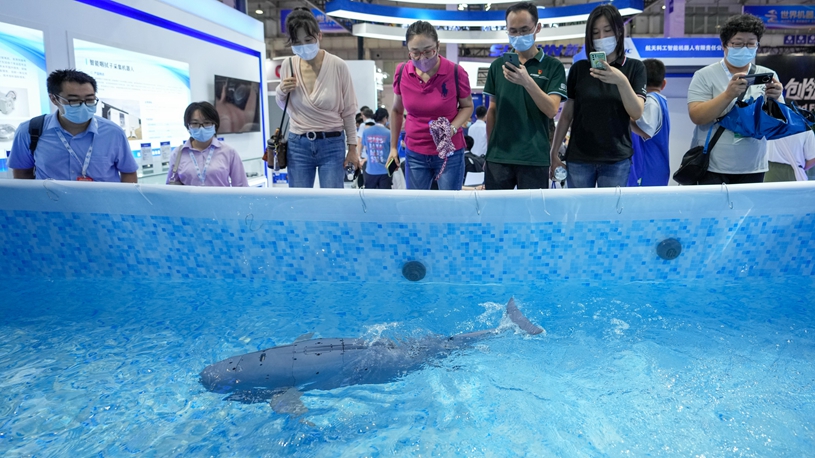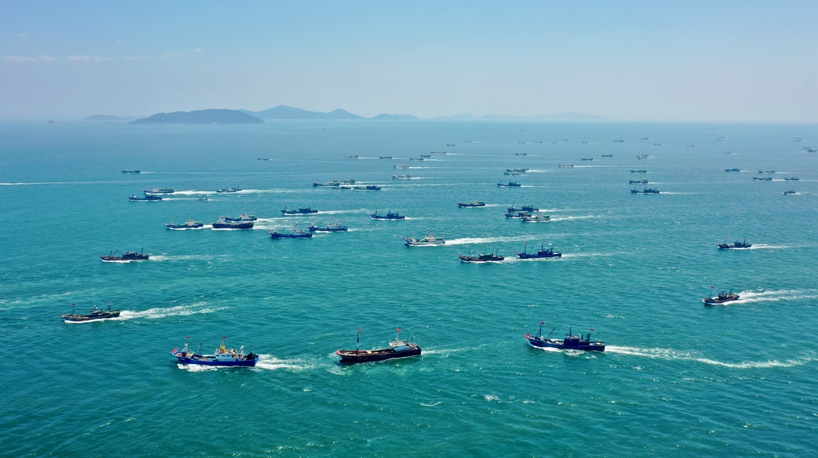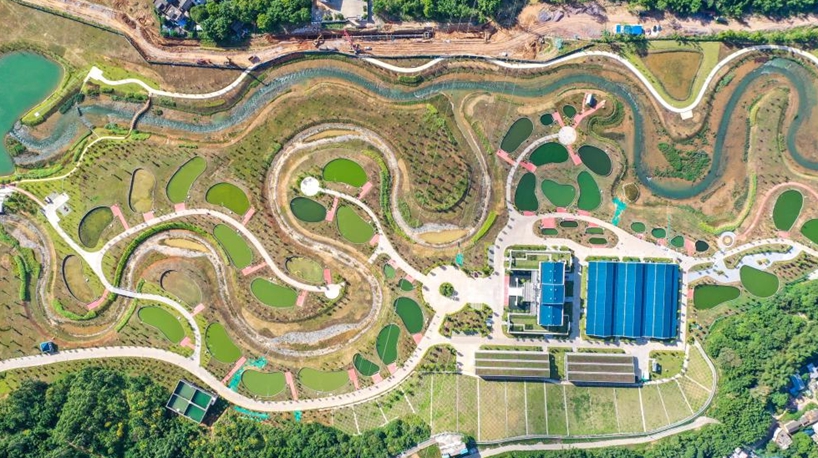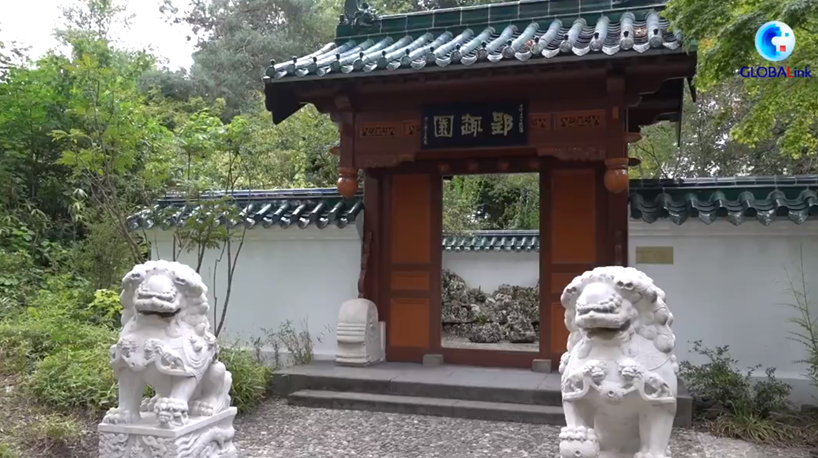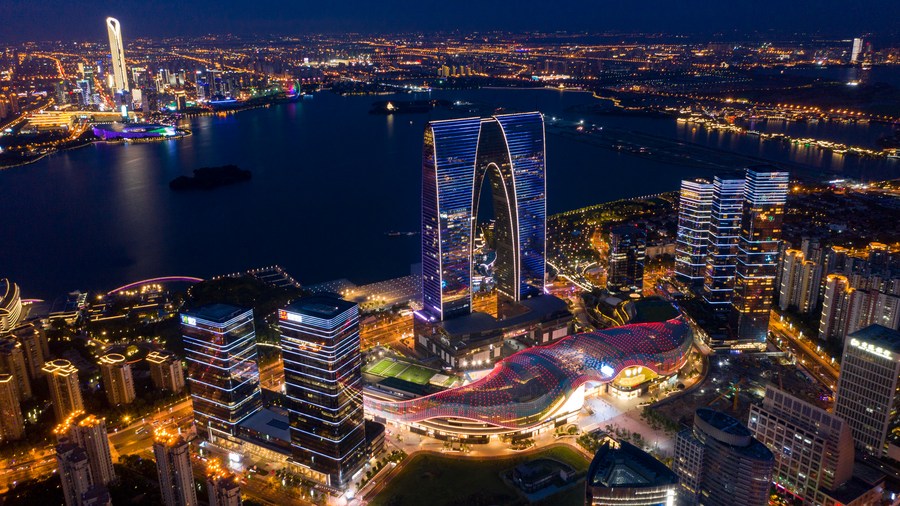
Photo taken with a drone shows modern buildings standing by the Jinji Lake in the Suzhou Industrial Park, Suzhou, east China's Jiangsu Province, July 23, 2020. (Xinhua/Li Bo)
NANJING, Aug. 20 (Xinhua) -- Gu Yahong, deputy general manager of Jiangsu General Science Technology Co., Ltd., has been remotely keeping an eye on the construction of a company plant in the Chinese-invested Sihanoukville Special Economic Zone (SSEZ) in Cambodia, almost 3,000 km away from east China's Jiangsu Province.
Earlier this year, the company kicked off a new production base project in Cambodia, which is also its second production base focusing on tire manufacturing in Southeast Asia.
Notably, this new plant is also Jiangsu's first project with an investment of more than 100 million U.S. dollars in a member country of the Regional Comprehensive Economic Partnership (RCEP) after RCEP came into effect. The first batch of tires produced by the company in Cambodia will roll off the production line at the end of 2022 and can be exported in March 2023 as scheduled, according to Gu.
"Thanks to the facilitation measures including customs clearance and cooperation on industrial park construction, the enthusiasm of both sides to push forward the project is even higher than the temperature in summer," Gu said.
This is an epitome of China and the Association of Southeast Asian Nations (ASEAN) deepening cooperation to jointly fend off development risks.
This year marks the 25th anniversary of cooperation among ASEAN Plus Three (APT) countries, namely ASEAN, China, Japan and the Republic of Korea (ROK). To stabilize and strengthen the industrial chain and supply chain has become the common pursuit of ASEAN, China, Japan and the ROK.
These countries have been adhering to the values of openness, inclusiveness and cooperation while promoting regional economic and trade cooperation, and have become the key force for safeguarding and stabilizing the global industrial chain and supply chain over the past years, said Li Fei, assistant commerce minister.
The Suzhou Industrial Park (SIP), a major intergovernmental cooperation project between China and Singapore established in 1994, has consistently optimized the local business environment to attract more overseas investment and boost in-depth cooperation and exchanges between Chinese and Singaporean enterprises.
The Agency for Science, Technology and Research Partners' Centre, launched in 2020, serves as a service platform in the industrial park to facilitate the operation and development of enterprises.
"Our center aims to support Singaporean businesses as they enter the Chinese market through SIP and localize the industrialization and commercialization of their technology. We can also let Chinese businesses know that they can have access to Singapore's entire ecosystem of scientific research, through which they can reach the Southeast Asian market," said Tan Chuan Seng, director of the service center.
Established in Singapore in 2016, Lucence Biotechnology (Suzhou) Limited specializes in molecular diagnosis and performs liquid biopsies utilizing next-generation sequencing technologies.
"We came to Suzhou in 2019 via a green channel set up by SIP and the center," said Aster Ding, the company's marketing director. "To establish a molecular laboratory, we truly need to invest a lot. So if there is such a platform for startups like us, we would be pleased."
Chinese and Singaporean enterprises starting new businesses and investing in each other's major industrial chains is a typical scenario of industrial chain cooperation between China and ASEAN nations, said Zhang Yueyou, a researcher at Jiangsu Yangtze River Industrial Economic Research Institute, Nanjing University.
In July, a forum on APT cooperation in industrial and supply chains was held in Jiangsu's Suzhou online and offline.
Shin Dong-whan, CFO of LG Energy Solution in China, said at the forum that though ROK commands the core technologies of LG new energy products, 65 percent of the production equipment and raw materials rely on imports. RCEP's tariff reductions can help cut the production cost, improve production efficiency and facilitate the export of the products.
The stability of industrial and supply chains is the ballast stone of economic security. The instability of the world economy and the COVID-19 pandemic have made people realize the great importance of regional cooperation, Shin added.
Many attendees of the forum also advocate that APT countries can cooperate to explore the digital economy and build connectivity through research and development of advanced digital infrastructure.
Malaysia's digital economy contributed about 22.6 percent to the country's GDP in 2021 and the country plans to boost the share to 25.5 percent by 2025, said Mustapa Mohamed, minister in the Prime Minister's Department for Economic Affairs, via video link during the forum.
The Malaysian official also proposed that APT countries can "pursue greater collaboration in the area of digitalization in order to enhance high value-added and technology-intensive trade and investment activities in the region." ■


